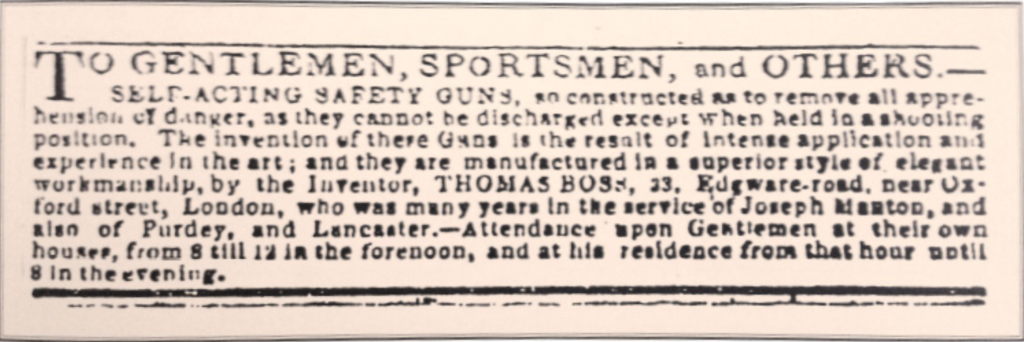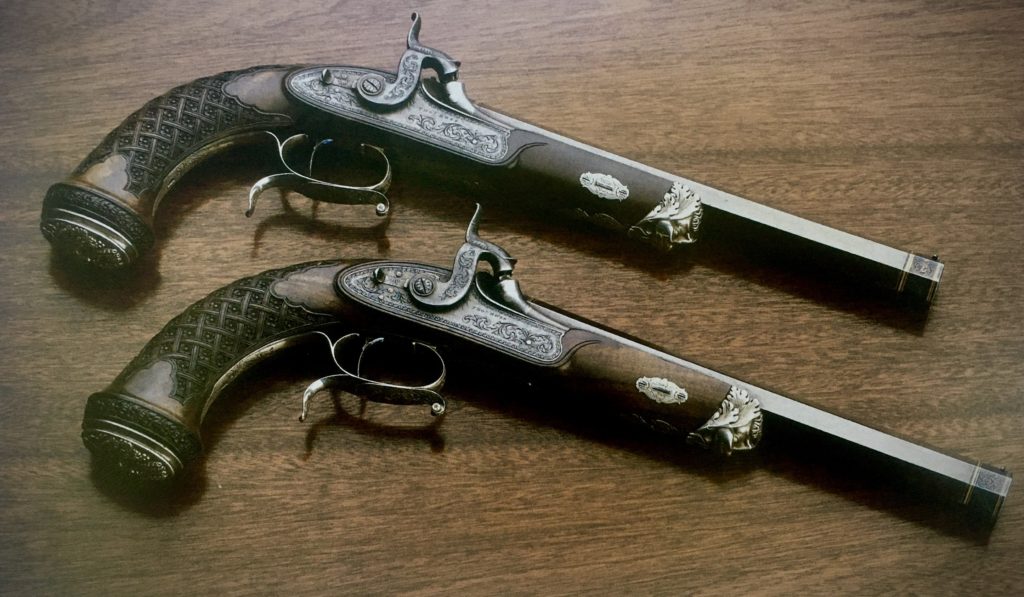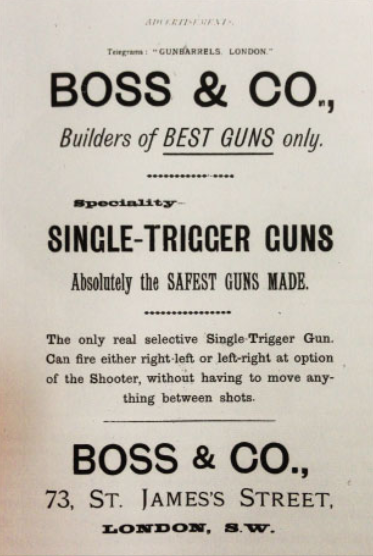Our History
Boss & Co is London’s oldest gunmaker, a company that has remained in privately-owned operation since being established. Whether you are a seasoned shooter, an owner or an enthusiast, this insight into Boss & Co history will tell the story of the innovators and craftsmen who made the company what it is today.
LATE 1700s TO EARLY 1800s
Boss. A family name synonymous with fine gunmaking.
The Boss family originated from Leicestershire and had no roots in gunmaking when William Boss began an apprenticeship in 1773, aged just 15. His commitment to becoming a gunmaker was clear, and he moved away from his family to Birmingham to be closer to his mentor, gun and pistol maker Thomas Ketland.
Excelling at his craft, and already making a name for himself, William Boss then moved to London where the finest guns were being produced. There he could further refine his skills and become a part of the dominating London gun industry.
Soon he found a new mentor: Joseph Manton. He was a leader in his field and a man who only employed top-rate journeymen which, by this time, William was.
Staying with Manton for a number of years, William fathered three sons during his time with the firm, each of whom became an apprentice to their father. Sadly, while teaching his youngest son Thomas the art of gunmaking, William died. At this time, the death of a gunmaking father marked the end of any apprenticeship for his remaining sons. But Manton made an exception for the 19-year-old Thomas and allowed him to continue with the firm as his natural talent for the craft was clear.
Little did anyone know that by allowing Thomas Boss to continue his apprenticeship, it would be the start of a story that would secure the Boss family name at the very heart of gunmaking for centuries to come.
1812 -1826
Building Boss & Co
Eventually Thomas established a name for himself as a top gunmaker. He worked mostly as an outworker, a position that saw him finishing guns for the best-known gunmakers of the time – something he excelled at.
This way of working continued for many years, and we have to remember the sheer scale of the London gunmaking business at this time meant he was a man in demand. The quality of his workmanship ensured his reputation as a gunmaker of esteem across the city; however, for a man as ambitious and industrious as Thomas Boss, it wasn’t long before he gained the will and capital to create a gun bearing his own name: Boss.

In 1812 Boss & Co was born. Thomas placed adverts in newspapers addressed to gentlemen, sportsmen and others, announcing Boss & Co to the nation. These adverts promoted ‘self-acting safety guns, constructed to remove all apprehension of danger as they cannot be discharged except when held in the shooting position’. Proudly, these guns were manufactured ‘in a superior style of elegant workmanship’ by Thomas Boss of Edgware Road, London.
At this time, Thomas provided home visits to potential customers by day, and at his private home of an evening, but that was soon to change.
1827 – 1856
The making of Boss & Co
As is true of any company wanting to make a name for itself amongst established competition, Thomas Boss knew the importance of image.
A home visit was a great way to start, but the monied gun buyers of London liked the kudos of visiting premises where they could touch and feel the product and see it being made. A move to the West End sent out the right message, and 73 James’s Street became the iconic home of Boss & Co.
As the reputation of Boss & Co grew, so did the number of customers through the door. Soon Thomas Boss sought his own apprentices and journeyman gunmakers, needing up to ten skilled staff and two apprentices. Two of these new employees were nephews of Thomas Boss, men who would go on to play an important role in the future of Boss & Co as it developed.
1851 saw Boss & Co invited to participate in Prince Albert’s Great Exhibition alongside other renowned gunmakers. This invitation marked the increased status of Boss & Co as one of London’s leading gunmakers and to celebrate they created a special pair of dueling pistols for the event. These pistols are now back in Boss & Co ownership and form an important part of the company archive.

1857 – 1890
The Paddison Years
By now Boss & Co was a well-established, highly regarded gunmaker. Their output was sought after and their order book ever-increasing.
Thomas Boss, the creator of this success and reputation, died in 1857 having lived to see his name rise to the highest levels, but he left behind a company without leadership and direction.
By default, Amy, widow of Thomas, took over the business. But she had no gunmaking experience and would often seek the support and guidance of her employees to help run the company, a situation which was far from ideal for the now-famous Boss & Co.
Ageing in years, Amy turned to her nephews Edward and James Paddinson for assistance. The partnership worked well and lasted for many years up to the death of Amy in 1872. Edward and James then took over the firm as beneficiaries of her will.
The Paddinson brothers had trained and worked with Boss & Co for many years and were well-placed to continue its legacy. However, James Paddinson died just one year after taking control, leaving Edward as sole custodian.
Edward continued to produce the best quality London guns for the next 17-years, with high quality continuing to take focus over innovation and evolution. In 1890, ill health and personal financial concerns prompted him to seek a partner, and he welcomed John Robertson to the fold.
Robertson has long-supplied skilled work to Boss & Co and, having had first-hand experience of his work, Paddison had little hesitation in offering Robertson a half-share in the company.
1891 – 1917
The Robertson Era
The Robertson-Paddinson partnership would last just one year before Edward succumbed to illness and died.
Upon the death of Paddison in 1891 his half share passed to a nephew who had little interest in anything other than drawing his share of the profits. Eventually, in 1893, Robertson bought out the other half share and became the sole owner of Boss & Co, having had to re-mortgage his home to release the required funds. The company was now, finally, under his sole control.
Robertson was a recognised, first class gunmaker to the trade and had worked for a number of established gunmakers before joining Boss & Co. But what excited him was innovation. Ownership of the company gave Robertson the platform he needed to release his ideas and Boss & Co, a brand which until now had focused on quality over innovation, would soon unleash a number of new concepts upon the market.
The Robertson era of Boss & Co was, to date, probably the most important period in the history of the company. It was a time when the company became known for quality, beauty and innovation and was a development which led to the Boss & Co name being revered around the world.
There is much to celebrate with Robertson, as he can be thanked for important innovations such as the Boss Single-Trigger, the Boss Ejector and the Boss Over and Under, each of such huge importance to Boss & Co, and the gun trade as we know it today. Such is the importance of the innovations of the Robertson era, a detailed account of each can be found here.

Another Boss & Co trademark that can be attributed to this period is Boss Rose and Scroll engraving. The Rose and Scroll design, introduced by Robertson, was the creation of an engraver named John Sumner, the third of four generations of engravers who all worked on Boss & Co guns. Again, we can attribute this era for creating one of the most recognizable elements of a Boss & Co, and one that remains a popular choice of finish to this day.
Robertson is a man who continues to be held in high regard, quoted as making the last significant changes to sporting guns, and shaping the way Boss & Co would be known for generations to come.
1917 – 1999
The Young Governors – The End of The Robertson Line
1917 saw the death of John Robertson, and Boss & Co was passed to the very capable hands of his three sons John, Sam and Bob, known in the industry as ‘The Young Governors’. The 1930s proved to be a tough time for gunmakers, but the young trio ran the firm with efficiency and continued to produce guns to a high standard for a discerning clientele.
Each of the brothers established a role for themselves within Boss & Co. John was in charge of the shop, now located in Dover Street, London. Sam managed the factory in Lexington Street, London, and Bob ran the shooting ground in Hendon.
By 1951 the last of the Young Governors died, but for many years thereafter the firm would still include a descendant of John Robertson amongst its ranks. It was as late as 1999 when the last Robertson left Boss & Co and so ended a family connection that had lasted for 109 years.
PRESENT
Boss & Co Today
Boss & Co continues today in private ownership as it always has since its founding in 1812, as London’s oldest gun company. Today it is owned by Arthur DeMoulas a man with a long-standing knowledge of, and appreciation for, the company, our heritage and guns.
Driven by his passion Arthur was finally able to acquire the company after many years of negotiating, such was his drive and determination to see the company run as he knew it deserved to be.
He understood the importance of private ownership, a fact which has enabled Boss & Co to continue to focus on building “Best Guns Only” and lead the revered ‘holy-trinity’ of London gunmakers, unencumbered by the distractions of diversification, that can arise from being part of a large luxury lifestyle brand conglomerate.
In fact, the first decision that Arthur communicated to the workforce on buying the company was that Boss & Co would continue to make “Best Guns Only” by hand, using traditional methods. Second grade and machine made guns would never be built at the company.
Since then under his leadership, the company has invested in the London workshop, has helped to secure key suppliers and set up an apprenticeship scheme to train and pass on the skills to a new generation of Boss & Co London gunmakers.
With full workbenches and an extended team of master craftsman, the next stage of Arthur’s vision was set in motion revitalising the excitement for innovation that was seen at Boss & Co during the late 1800s and early 1900s, when our company led the gun making world with new inventions, design and style.
Work is now underway to re-introduce unique Boss & Co products not seen for over 100 years, providing continuity with the most celebrated periods in our history under the stewardship of our forefathers such as John Robertson and Thomas Boss.
For Arthur, he simply sees himself as a custodian and trustee of the company in the continuum of the storied history of one of the most famous gun companies in the world. His enthusiasm, investment, drive, knowledge and respect for the company and passion will continue to set Boss & Co apart as the gun makers and builder of “Best Guns Only”.